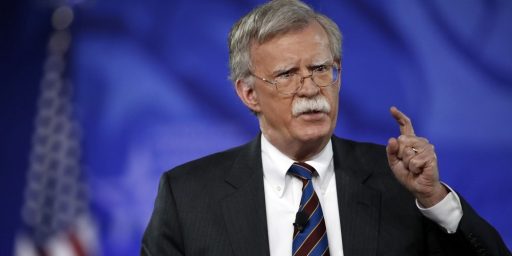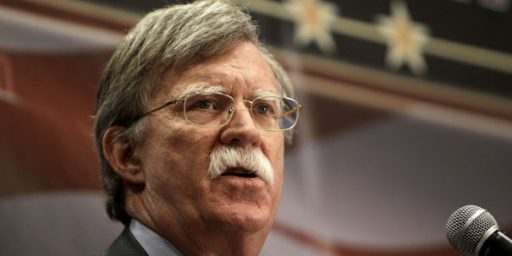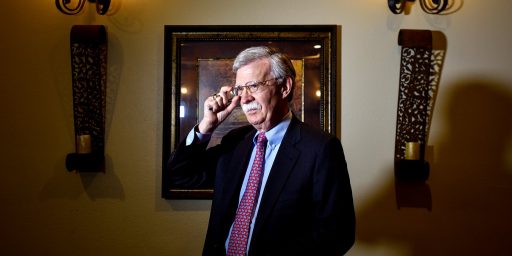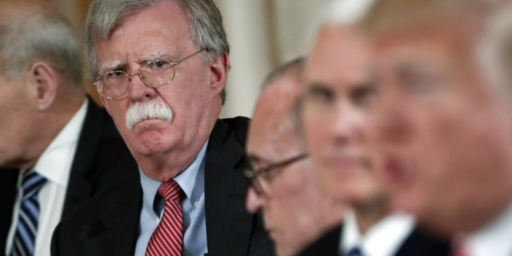Defending Bolton: Unlikely Sources
Anne Applebaum, somewhat surprisingly, offers up a strong defense of John Bolton for UN Ambassador:
For the record, let me begin by repeating a few quotes from John Bolton, newly nominated as ambassador to the United Nations, just so that no one can accuse me of naivete. He has said, “The Secretariat building in New York has 38 stories. If it lost ten stories, it wouldn’t make a bit of difference.” He has said that “wishful thinking about the United Nations . . . ran into a wall of reality in Kosovo.” He has been skeptical of U.N. peacekeeping operations, skeptical of the U.S. obligation to pay its U.N. dues, skeptical of just about everything, really, to do with the United Nations.
All of which makes him an ideal candidate to be America’s U.N. ambassador. Bolton — whom I’ve met but don’t know well — is blunt, which is an advantage in an institution where words are more often used to disguise meanings than to elucidate. He is unafraid of being disliked, which will be an advantage in a place where everyone will dislike him. In the past he has been unafraid of arguing his points, even in Europe, where they are deeply unpopular. Most of all, though, Bolton, who has been writing about the United Nations for decades, is one of the few people in public life willing to draw the distinction between what the United Nations actually is and what everybody would like it to be.
Sounds a whole lot like Don Rumsfeld to me.
Update (1432): LAT’s Jacob Heilbrunn weighs in with, “U.N. May Need Bolton’s Bitter Medicine.”
Despite the rhetoric, it would be foolish to dismiss Bolton, now undersecretary of State, as an obstructionist conservative troglodyte. In fact, there is a rich GOP tradition of appointing critics of the U.N. as ambassadors to that body, a tradition that has proved remarkably effective.
It began with President Ford’s naming of Daniel Patrick Moynihan in 1975. Moynihan did not just display contempt for the U.N., he flaunted it. When the General Assembly passed a resolution calling Zionism racism, Moynihan declared: “This is a lie.” After Idi Amin spoke to the General Assembly in October 1975 and called for the “extinction of Israel as a state,” Moynihan did not hide behind the diplomatic niceties usually on display in the chamber — he called Amin a “racist murderer.” Moynihan was defending liberal democracy against what he saw as the despotic Third World countries that were perverting the true mission of the United Nations.
The same went for Ronald Reagan’s ambassador, Jeane J. Kirkpatrick. She had no patience for what she viewed as the idiocies of the General Assembly that had been tolerated and encouraged by her Carter administration predecessor, Andrew Young. Like her fellow neoconservative, Moynihan, she bluntly assailed the “nonaligned movement” of Third World countries. After the 1983 liberation of Grenada, Kirkpatrick told the Security Council that the U.N. Charter “does not require that people submit supinely to terror, nor that their neighbors be indifferent to their terrorization.”
Where does this put Bolton? Like Moynihan and Kirkpatrick before him, Bolton’s well-known antipathy to the U.N. means that he is well suited for the job of trying to rebuild the institution, which has accomplished the remarkable feat of squandering what little credibility it has left.
Some good company, indeed.





